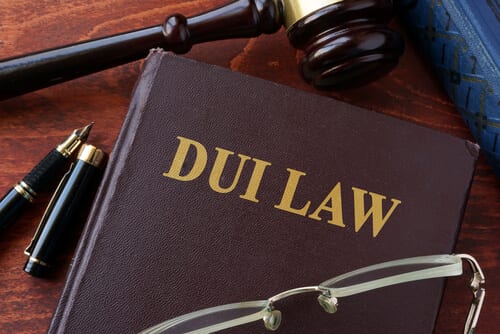who were ticketed or arrested in Cook, DuPage, or Lake County, Illinois.





Everything You Need to Know About Illinois DUIs
Illinois DUI laws address the amount of an intoxicating substance you can have in your body while operating a motor vehicle. Violating these DUI laws can lead to criminal charges, which may be either a misdemeanor or felony charge depending on the circumstances which lead to you being charged with a DUI.
According to the Illinois Secretary of State, driving under the influence is defined as “operating a motor vehicle while impaired by alcohol, other drugs, including cannabis (marijuana) prescribed for medical purposes, or intoxicating compounds and methamphetamine.” If you are charged with a DUI, you don’t simply have to accept the charges — and the consequences that come with it, like jail time, hefty fines, and a driver’s license suspension. Instead, you can fight back with the help of an Illinois DUI defense attorney.
While Illinois’ DUI laws are harsh, that doesn’t mean that there is no way to defend against DUI charges. There is a range of factual and legal defenses that your lawyer can develop to get the charges against you reduced or even dismissed.
What happens if you get pulled over with a suspended or revoked license?
What Is the Legal Limit?
In Illinois, drivers are legally considered to be under the influence if they have a blood alcohol content (BAC) of .08 or more, have a tetrahydrocannabinol concentration (THC, found in cannabis) of either 5 nanograms or more per milliliter of whole blood, or 10 nanograms or more per milliliter of other bodily substance, have used any other controlled substance, or are impaired by medication. These laws include both prescription and over-the-counter medications if taking them impairs your ability to drive.
While DUI laws in Illinois allow for a certain amount of cannabis and/or alcohol to be present in your system, other controlled substances are not permitted to be in your system under any circumstances. This means that even trace amounts of certain controlled substances cannot be present in your body while operating a motor vehicle in Illinois.
Types of DUIs
There are several DUI laws in Illinois, each relating to different intoxicating substances or combinations of intoxicating substances. The controlling law for DUI in Illinois is 625 ILCS 5/11-501. Under this law, you can be charged with any one or more of the seven subsections of the DUI statute based on the specific facts of your case.
The Illinois DUI law states:
A person shall not drive or be in actual physical control of any vehicle within this State while:
- the alcohol concentration in the person’s blood, other bodily substance, or breath is 0.08 or more based on the definition of blood and breath units in Section 11-501.2;
- under the influence of alcohol;
- under the influence of any intoxicating compound or combination of intoxicating compounds to a degree that renders the person incapable of driving safely;
- under the influence of any other drug or combination of drugs to a degree that renders the person incapable of safely driving;
- under the combined influence of alcohol, other drug or drugs, or intoxicating compound or compounds to a degree that renders the person incapable of safely driving;
- there is any amount of a drug, substance, or compound in the person’s breath, blood, other bodily substance, or urine resulting from the unlawful use or consumption of a controlled substance listed in the Illinois Controlled Substances Act, an intoxicating compound listed in the Use of Intoxicating Compounds Act, or methamphetamine as listed in the Methamphetamine Control and Community Protection Act; or
- the person has, within 2 hours of driving or being in actual physical control of a vehicle, a tetrahydrocannabinol concentration in the person’s whole blood or other bodily substance as defined in paragraph 6 of subsection (a) of Section 11-501.2 of this Code. Subject to all other requirements and provisions under this Section, this paragraph (7) does not apply to the lawful consumption of cannabis by a qualifying patient licensed under the Compassionate Use of Medical Cannabis Program Act who is in possession of a valid registry card issued under that Act, unless that person is impaired by the use of cannabis.
So what does all of this mean? Well, the first two subsections deal specifically with alcohol. The first subsection addresses drivers whose BAC is specifically over the legal limit of .08. This is determined by blood, breath, or urine analysis.
The second subsection specifically deals with suspicion of alcohol in your body that is impairing your ability to operate a motor vehicle. Basically, this means that an arresting officer suspects that you are impaired by alcohol, but has no direct evidence of your BAC being above or below the .08 legal limit.
Subsections 3 and 4 deal with similar circumstances as subsection 2, but address drugs and/or combinations of drugs that render the driver unable to safely operate a motor vehicle.
Subsection 5 addresses drivers suspected of being under the influence of both alcohol and a controlled substance(s) that renders the driver unable to safely operate a motor vehicle.
Subsection 6 is somewhat of a strict liability subsection for drugs and/or controlled substances. Strict liability is a legal concept that essentially means that you can be held accountable for violating the law without the need to prove certain elements, like knowledge or intent. For purposes of this subsection, ANY amount, however minimal, of a controlled substance is in your system while operating a motor vehicle can lead to a DUI charge. This determination is typically made by blood or urine analysis.
Criminal Penalties
If you are arrested for a DUI in Illinois, you can be charged with a Class A misdemeanor or even aggravated felony DUI, depending on the facts and circumstances which led to the arrest. Whether you are charged with a misdemeanor or felony DUI, the State’s Attorney or Village Prosecutor must prove that you are guilty beyond a reasonable doubt in order to meet the burden of proof in their criminal case.
Whether a misdemeanor or felony DUI, the outcomes can vary depending on whether this is a first-time DUI, or a second or greater DUI within a 10 year period. Potential outcomes include:
Dismissal of charges by the State
Finding of not guilty by a judge or jury
Plea to a reduced or lesser included charge
Court Supervision for 1 to 2 years (only for first-time offenders)
Conditional Discharge conviction from 1 to 2 years
Probation for 1 to 2 years
Fine up to $2500
Jail time in the Illinois Department of Corrections:
- Class A Misdemeanor DUIs range from 1 to 364 days in custody
- Class 4 Felony DUIs range from 1 to 12 years in custody depending on the nature of the offense.
- Class 2 Felony DUIs range from 3 to 28 years in custody depending on the nature of the offense.
- Class 1 Felony DUIs range from 4 to 15 years in custody depending on the nature of the offense
- Felony DUIs range from 6 to 30 years in custody depending on the nature of the offense
Supervision is only available for a first-time DUI offender. If you are charged with a second or subsequent DUI, the best offer that the State or village prosecutor can and will make is for Conditional Discharge conviction, in the vast majority of cases.
Statutory Summary Suspension
When charged with a DUI in Illinois, the second thing you must deal with is the Statutory Summary Suspension. This is not a criminal matter. It is a civil issue with the Illinois Secretary of State. Under Illinois law (625 ILCS 5/1-197.6), the Secretary of State can often suspend your license after a DUI arrest—even before you have had your day in court.
Do you remember the phrase “driving is a privilege and not a right?” Well, that privilege is taken away from you if you are over the legal limit or refuse breath, blood, or urine testing. The suspension of your license often goes into effect automatically on the 46th day after you receive a notice of the summary suspension. Notice is often (but not always) given to you on the day of the arrest.
The length of the summary suspension will depend on whether or not you submitted to chemical testing for the presence of alcohol or other intoxicating compounds.
- If you refused to submit to this testing, your license will be suspended for at least one year;
- If you submitted to the testing, and it showed a blood alcohol concentration of 0.08 or more, your license will be suspended for at least six months;
- If you submitted to the testing, and it showed 5 nanograms of THC in your blood or 10 nanograms of THC in your urine, your license will be suspended for at least six months;
- If you submitted to the chemical testing and showed any amount of a drug, substance, or compound resulting from the unlawful use of a controlled substance and/or an intoxicating compound, your license will be suspended for at least six months.
This suspension occurs regardless of the outcome of your DUI. After the period of suspension is over, you must pay a reinstatement fee to the Secretary of State. Your license will remain suspended until it is reinstated.
You Can Fight a Statutory Summary Suspension
After reviewing the police reports and watching the arrest videos, an experienced DUI lawyer may be able to identify ways to challenge the summary suspension. It can benefit you and your case if you speak with a DUI attorney shortly after your arrest. To challenge a statutory summary suspension, you must request a hearing within 90 days of the arrest. Our Chicago DUI defense lawyers can help you take action to preserve your driver’s license.
Illinois Requires a DUI Evaluation
Penalties for DWLS also depends if it is the first time you have been charged with DWLS, or if you have prior citations for DWLS. Typically, a first-time offender for DWLS is eligible for court supervision and community service, along with a possible fine and court costs. After receiving supervision for DWLS, drivers are generally not eligible to receive supervision. If you continue to drive while your license is suspended, and again get ticketed for DWLS, the charge can be upgraded to a Class 4, 2 or 1 felony, which depends on the amount of prior violations and the cause of the suspension. The consequences of being found guilty of a misdemeanor or felony DWLS only get more severe if you have multiple prior charges for DWLS.





Effect On Driver’s License
If you are arrested for a DUI in Illinois, you can be charged with a Class A misdemeanor or even aggravated felony DUI, depending on the facts and circumstances which led to the arrest. Whether you are charged with a misdemeanor or felony DUI, the State’s Attorney or Village Prosecutor must prove that you are guilty beyond a reasonable doubt in order to meet the burden of proof in their criminal case.
Whether a misdemeanor or felony DUI, the outcomes can vary depending on whether this is a first-time DUI, or a second or greater DUI within a 10 year period. Potential outcomes include:
Supervision is only available for a first-time DUI offender. If you are charged with a second or subsequent DUI, the best offer that the State or village prosecutor can and will make is for Conditional Discharge conviction, in the vast majority of cases.

